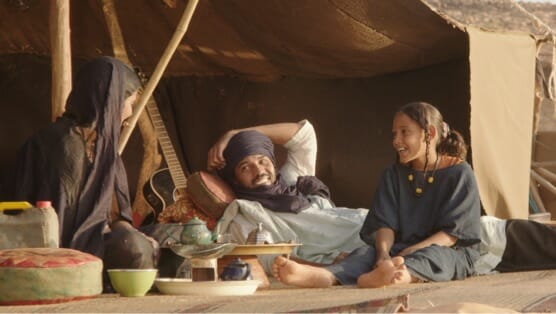Timbuktu

It’d be easy to forgive Timbuktu if it milked its subject matter for as much grandiose emotion as possible. After all, there’s plenty to get worked up about when examining the atrocities that Islamic jihadists committed while occupying North African villages. But director Abderrahmane Sissako (Waiting for Happiness) takes a more deadpan approach, dismantling the extremist ideology with sharp observations and clever juxtapositions.
Timbuktu recently became the first film from Mauritania to be nominated for the Best Foreign Language Film Oscar, and it’s a worthy entry for both its powerful story and the way it tells it. It takes place in and around the titular village in Mali (a border country to Mauritania) that extremists occupied in 2012. Their actions included destroying sacred statues and stoning men and women to death. Sissako’s disgust at what happened fuels this movie, yet he does not let rage become the primary force behind it.
In fact, one of the film’s most noteworthy qualities is how much humanity it brings to the jihadist characters. Abdelkrim (Abel Jafri), the town’s most prominent enforcer of fundamentalist law, is a hypocrite, but his cheats and inconsistencies play out more as endearing foibles than monstrous double standards. His secret smoke breaks and advances toward married women exude whimsy and absurdist humor. He is, quite simply, an ordinary man—as likely to fall prey to temptations and bad habits as anyone else. The difference is that when the people of Timbuktu are caught committing the same acts—or indeed less harmful ones—it can ruin or end their lives.
Sissako captures his story with poetic precision rather than gritty realism. Each shot is deliberately composed, and the transitions to new scenes follow a unique rhythm. The editing shifts between different parallel stories without always sticking to the conventions of establishing shots and character introductions. Some scenes almost function as stand-alone vignettes—the jihadists providing the through line to link the narrative. An old fishmonger gets in trouble for not wearing gloves, then goes on a tirade about how gloves would make it impossible for her to do her job. Musicians play in the privacy of their homes, risking punishment if discovered. The imam at the mosque challenges Abdelkrim over whether his rules have anything to do with Islam. The town’s eccentric old woman, colorfully clothed with chicken in hand, provides some of most visually striking moments as she defies the powers that be.